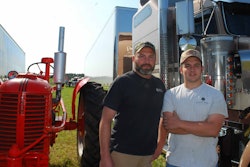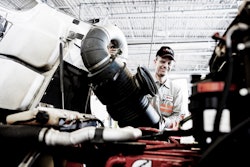Charlie Deull, part of the family that founded, and still owns and operates, the touring show-related freight carrier Clark Transfer, experienced the COVID-19 pandemic as an existential business threat. He watched as, quite literally overnight, the entirety of the bread-and-butter touring-theater business came an abrupt halt, sidelining the fleet then made up entirely of about 100 owner-operators.
Picayune, Mississippi-based owner-operator team Kim Barca and her longtime partner Martin Gaal Jr. had come to the company just a few years before. "This October it will be five years" leased to the company, Barca said. They met Deull at a trade show in 2017, around the time they walked away from a lease-purchase with Celadon when Barca said she could see the writing on the wall. (As regular Overdrive readers will well remember, Celadon imploded two years later.)
Pre-pandemic, Deull and company managed 100 trucks (with agents often contracting with outside carriers as well), around 20% of those helmed by teams like Barca and Gaal -- many dedicated to touring shows for months, even years at a time. The company then owned a fleet of 340 or so trailers “custom-designed for entertainment” industry hauling, Deull said. “In the span of about 36 hours” in 2020, “all the shows unloaded into about 225 of our trailers. Work stopped,” and life hung in the balance for the entire company and the businesses it supports.

Clark shifted to hauling general freight, but continued to compensate “those doing general freight like they were doing show work” to an extent, Deull said, borrowing money as a company and, ultimately, running losses through it all. “We lost a bunch of money until show business started back up.”
A lot of their leased owner-operator core, too, moved on to other things, but Barca said she and Gaal elected to stay put with their 2016 Volvo VNL 780, powered by a Volvo diesel and automated iShift transmission.
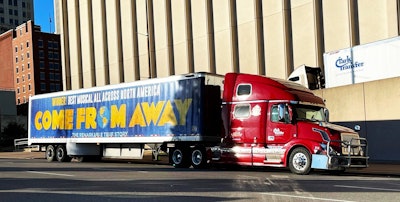 Owner-operators Barca and Gaal are today dedicated to the "Come From Away" tour, currently in San Jose, California.
Owner-operators Barca and Gaal are today dedicated to the "Come From Away" tour, currently in San Jose, California.
"Going through COVID was a little rough," Barca said, particularly so when a failed turbo in December 2020 put the truck down for 3.5 months, "partly due to the cost and partly because of the availability" of parts, with supply chains worldwide by then truly in unprecedented territory. Barca was helped by another owner leased to Clark, who offered a loaner truck to keep the team going through part of the downtime.
"It really saved my behind, you might say," she said, then underscoring one of the principal reasons the pair elected to stay put. "We’ve got some wonderful owner-operators. It's not just the company that’s so fantastic, it’s also the other owners we work so closely with all the time."
Yet COVID was a definite shock to the whole system, and when Broadway began to return in earnest last year, the leased fleet at Clark Transfer was essentially half its pre-pandemic size. Efforts at recruiting were stymied by a mixture of a booming spot market and the reality that Clark’s business, though above-average in owner-op compensation, is somewhat below average when it comes to home time and other creature comforts, given the touring nature of its freight.
“While we will always get somebody home when they say they need to be” for the most part, Deull said, “it can’t be every week.” Two months, 10 days advance notice, “we can do that.” But it’s just “not compatible with every week, every two weeks. That’s not how touring shows work.”
Yet purchasing powered equipment and hiring company drivers was not in the cards for the fleet. As Deull put it, "we for years have believed that the people who made this all happen are amazing owner-operators." Clark, rather, elected to adjust its leased-owner compensation structure to provide a backstop to add a measure of income security that would be particularly attractive to business owners whose memory of the pandemic was fresh.
The move was one few carriers have been willing or able to make.
“We started an actual guarantee program,” Deull said – a model that among leased owner-operators is very uncommon indeed. Overdrive’s last owner-op compensation survey found just 5% of leased owners reported any kind of guaranteed revenue backstop in their leasing fleet’s compensation structure, though minimum weekly and monthly, sometimes annual salary, guarantee programs are increasingly common for company driver compensation.
In terms of recruiting and orienting new owner-operators to the business, the family behind Clark Transfer prides itself on being above-board, with an intent in a perfect world to “under-promise and over-deliver” when it comes to compensation. Owner-operators, Deull said, “have been lied to at so many places before. My mother had three rules growing up: never lie, do what you say you’re going to do, and never be late." As a company, he hopes Clark Transfer runs by the same principles.
The minimum-guarantee structure ($3,500 weekly revenue per seven-day week worked for solo operations, $5,000 for teams) Deull said is a “way of putting our money where our mouths are” when it comes to the promise of revenue achievable leased to the company.
The company’s average leased solo owner grosses between $175,000 and $200,000 annually on just 80,000 or so miles, and an average team $225,000-$300,000 on just 110,000 miles, the company states in a document that fully spells out the program for leased owners and illustrating the lesser wear and tear a rig leased there will undergo. (Barca pointed to mileage on their 2016 Volvo sitting at right around 230,000 miles five years ago when they bought it and leased on, and it has just 670,000 miles on it today.)
 Kim Barca and Martin Gaal Jr. enjoying ice cream at Wall Drug in South Dakota during some downtime -- plentiful as part of their touring operation, paid a weekly rate for dedication to a single show in addition to miles pay, the fuel surcharge and other compensation.
Kim Barca and Martin Gaal Jr. enjoying ice cream at Wall Drug in South Dakota during some downtime -- plentiful as part of their touring operation, paid a weekly rate for dedication to a single show in addition to miles pay, the fuel surcharge and other compensation.
Given the big return since late Fall 2021 of Broadway and other touring business, though, Deull said in early May, for leased owners who’ve been fully integrated into the company’s operation for some time the minimum guarantee had not applied for a single one. That's also been the case with Barca's operation, she said.
Where it had come into play was among newly leased owners, compensating their very first weeks with the company as they get their footing within the system.
Previously, “in a normal cycle,” Deull said, it wouldn’t be before the third weekly settlement check that revenue would even begin to reflect over-the-road realities. Now, for the first four weeks of a leased owner or team’s time at Clark, the guarantee applies no matter what. This has been “extremely popular” among owners, he added, since making that switch in late Spring/early Summer retroactive to the beginning of the year.
The change, too, is “actually costing us money,” Deull said. “It’s expensive, but worth it” for the commitment it shows to building the foundation of the business partnership. "We are getting strong traction now on recruiting."
With the change in the guarantee, Clark this year has also temporarily instituted quarterly bonuses for all leased owners that amount to $10,000 annually per operator -- a way to better share, Deull felt, the fruits of Broadway freight’s return. For Barca and Gaal, that will amount to an extra $20K in the bank by the end of 2022.
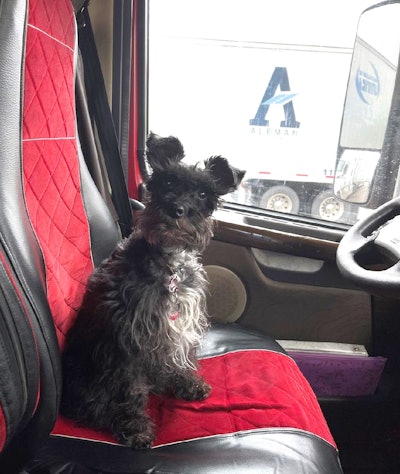 Who's really in charge of the Volvo, though? Pictured here is Dixie, the minature Schnauzer who helps pilot Barca and Gaal's journeys across the country. Given plentiful downtime out on the road, Kim Barca notes she feels like she's experienced more of the nation's historic sites and sounds than many Americans see throughout their entire lives.
Who's really in charge of the Volvo, though? Pictured here is Dixie, the minature Schnauzer who helps pilot Barca and Gaal's journeys across the country. Given plentiful downtime out on the road, Kim Barca notes she feels like she's experienced more of the nation's historic sites and sounds than many Americans see throughout their entire lives.
The surcharge is also set to be paid not just on loaded miles, but all dispatched miles, whether bobtail, empty and/or loaded, as is base mileage pay, Barca noted. The fuel-surcharge change is one where they're seeing some tangible benefit, given their rig typically hovers around 6 mpg. Pulling hills and occasionally heavier loads, though, can cause mileage to dip below the fleet average.
Those two structural changes have delivered an uptick in new owners reaching the company and, if Deull’s right, will better cement relationships with those new owners for the long term.
“After losing half the fleet,” he said, “we feel like we’ve got a pipeline” of committed owner-operators incoming “that’s in good stead. It’s hard to put a finger on any one piece of this that’s starting to work or will work, whether it’s conditions in general freight, whether we’re reaching people better, or whether it’s this combination of new things” aimed at better backstopping revenue to mitigate unforeseen circumstances.
One thing’s certain in his view: “The group of programs collectively” do in fact better “communicate our attitude – a belief in the importance of the owner-operator” to the present and future of Clark Transfer.
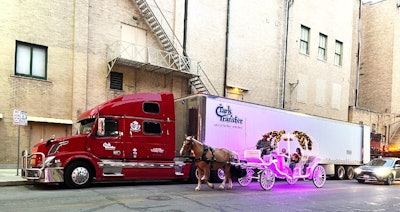 Barca and Gaal's 2016 VNL unloading at San Antonio's Majestic Theatre
Barca and Gaal's 2016 VNL unloading at San Antonio's Majestic Theatre
There's some evidence such attitudes are yielding the same from owners leased there. Barca told of a situation she and Gaal ran into picking up a dropped trailer parked at a theater by an outside carrier such that the owner-operators were going to have to come at it from the side rather than backing straight under it as normal.
"I could have had Clark call a tow truck to move it two feet" and have a delay in service, Barca said, yet she chose an inevitability of damaging a tool box on their catwalk versus taking the delay. "Of course, we pulled all the tools out in the passenger seat, and we’re staying in downtown San Jose."
The next day, a call from the office manager for Clark in Harrisburg, Pennsylvania, called to check in on how the show was going.
Barca relayed they had finished a series of loads and were headed to pick up a new tool box soon. "She said, 'Upgrading?' Not exactly, I said, it’s pretty well damaged," telling the story then of their decision to damage it rather than hold everyone else up on that load.
The office manager: "When you get that receipt would you send it to me?"
Barca: "Yeah, I can do that," though also indicating she wasn't expecting anyone other than themselves to pick up the bill.
End result? The only part of the tool box replacement the company didn't reimburse was the purchase of bolts from Home Depot for the installation, "because I didn't send that receipt," Barca said. "It’s little things that this company does that keeps drivers around. They want us happy and they want us profitable and they’re doing everything in their power to make sure we are. I don’t get lied to about what they need me to do. I jump through whatever hoops I need to, to get it done."
[Related: The COVID-survival tale of one of the hauler for some of the biggest acts in popular music]


